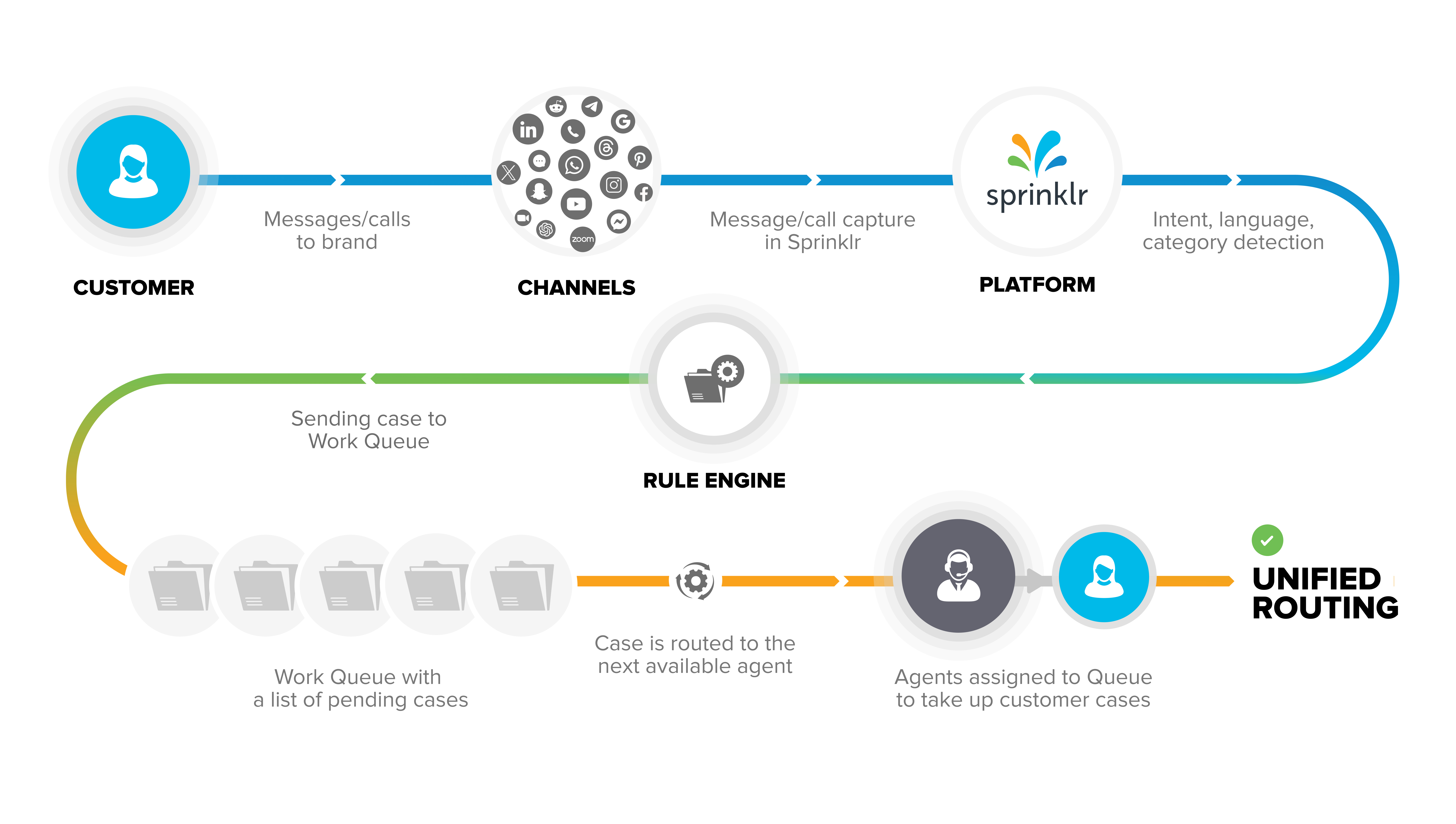What is Unified Routing ?
Updated
Ensuring customer satisfaction is paramount for any brand striving to maintain a positive reputation and foster long-term loyalty. When a customer raises a query, they expect prompt, effective, and personalized support from the brand. When customers message/call to a brand's helpline number, firstly, they anticipate a timely response, wanting their inquiries to be addressed quickly without significant delays. Then, when connected to an agent, they expect quick and satisfactory resolution to their problems in one go without the need to come back again. In overall, a seamless and positive experience is expected by a customer, where their queries are handled efficiently, their concerns are understood, and their needs are met in a personalized manner.
Current Challenges
In the prusuit of above, the significant challenge faced by organizations is the time consuming and inefficient process of manually assigning customer queries to the respective agents. Customers find themselves waiting for extended periods before their inquiries are addressed, resulting in mounting frustration and a negative perception of the brand's responsiveness. With different agents possessing varying levels of expertise and availability, the assistance provided to customers may differ significantly, causing confusion and dissatisfaction. Thus there is a need for a more streamlined and efficient approach to route customers queries to agents. And you guessed it right, this is what Unified Routing solves.
What Unified Routing solves ?
Unified Routing is an automated system that intelligently routes incoming calls, messages, or cases to the most appropriate agents or representatives within a contact center or customer support organization. It leverages intelligent algorithms and predefined rules to ensure that each customer inquiry is directed to the most appropriate agent, i.e., the system choses the agent who is available and has the best set of skills which is required to solve the customer's query. By implementing automated routing systems, brands can ensure that customer cases are promptly directed to the most appropriate agents, optimizing response times and increasing customer satisfaction.

Features of Unified Routing
One Agent, Multiple Channels
In Unified Routing, various channels of communication are consolidated into a single routing system. This means that customer inquiries from different channels like phone calls, emails, social media messages, or chat messages are all managed and routed through the same system. This consolidation of channels within a single platform allows agents to handle all customer inquiries from different channels seamlessly, without the need to switch between different tools or platforms.
Skill based Case Handling
By utilizing skill-based assignment in Unified Routing, brands can ensure that customer cases are routed to agents with the right expertise, leading to improved resolution rates, faster response times, and enhanced customer satisfaction. It also optimizes resource utilization, as agents can focus on cases within their skill set, leading to more efficient and effective support delivery.
Uniform Workload across Agents
Unified Routing enables brands to better manage agent workloads, ensuring equitable distribution and preventing overload. This balance in workload allocation allows agents to dedicate their time and expertise to addressing customer inquiries rather than being overwhelmed by excessive cases. Consequently, the brand's responsiveness and support quality improve, instilling confidence in customers and reinforcing brand loyalty.
Crisis Management
During a crisis or when there is a sudden surge in case volumes, unified routing can automatically transfer cases from one queue to another. This transfer is based on predefined conditions and rules set within the system like in case of high estimated wait time in a queue or agent unavailablity in the queue. By swiftly moving cases to different queues, it ensures that the workload is distributed evenly and prevents overwhelming any specific queue or agent.
Easy to Customize Assignment Settings
Unified Routing offers a user friendly interface that allows administrators or managers to make changes to the assignment flow with ease. You can define and modify the rules, conditions, and logic that govern how cases are assigned to agents. This customization can include factors such as skill-based routing, priority-based routing, or other criteria that align with the brand's service strategy.
Real time Monitroing of Case Assignments
Furthermore, unified routing provide features such as real-time monitoring, reporting, and analytics to track and measure key performance indicators like Total number of cases assigned, Number of Customer Queries Waiting in the queue, Average Wait Time of cases in the queue, This data can be used to fine-tune routing rules, optimize workflows, and continuously improve the customer support process.
Troubleshoot assignment failures
In situations where case are not assigning to the available agents, unified routing logs the reasons for assignment failures. This log captures details such as capacity breach of agents, no agent with required skills to handle the case or any specific conditions that prevented the case from being assigned. This information is valuable for troubleshooting and identifying potential issues in the assignment flow.